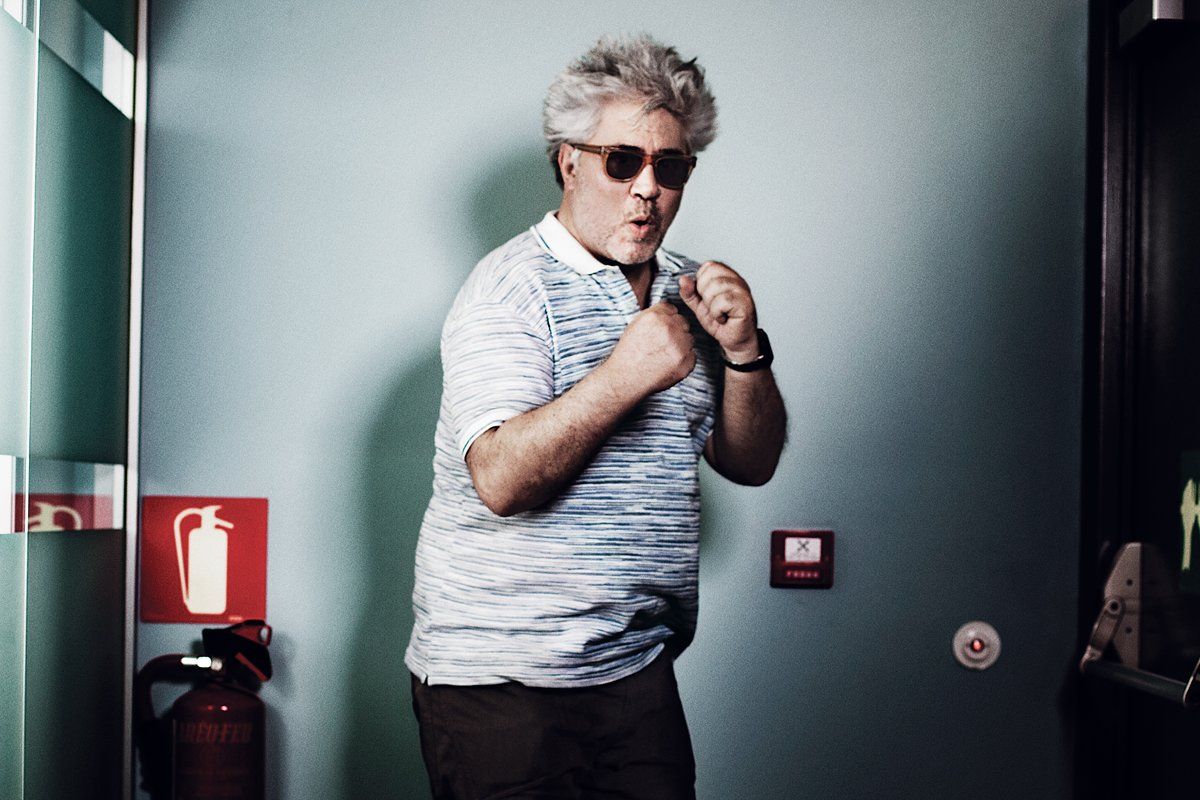
On a blank little street in Madrid called the Calle Navacerrada, near a park devoted to Eva Perón, stands the headquarters of El Deseo. "Desire"—it's the perfect name for Pedro Almodóvar's production company, the crucible for all his films including Law of Desire, the movie that helped make a star out of a young Spanish actor named Antonio Banderas. Through anonymous blinds one can glimpse an illuminated poster for Almodóvar's latest film, La Piel Que Habito ("The Skin I Live In"): it shows the eyes of Banderas and a woman in a flesh-colored mask. Almodóvar's tale of a mad surgeon who creates an experimental -woman out of transgenic tissue is a thriller that harks back to the German expressionist thrillers of the 1920s, like The Cabinet of Dr. Caligari and the early films of Fritz Lang.
In an upstairs office hung with enormous versions of his movie posters, along with one for All About Eve (a key inspiration for Almodóvar), the director sits at his desk with a tray of coffee cups and sheaves of papers. The office has the look of a small library—there are handsome volumes of Robert Mapplethorpe and Dior on the shelves—and the feel of a novelist's study. "I work like one," he admits. "I carry different projects around for years, just like a novelist. I write like a writer, if you see what I mean."
At 62, he has not lost his voluble, boyish electricity. Almodóvar is a great talker, but—perhaps surprisingly—he talks without gesticulation or exaggerations. He slips between English and Spanish quite easily, and he likes to chat, charlar, but without too much small talk.
Asked why his new film differs so widely from the French novel upon which it was based—Thierry Jonquet's Mygale, which was published as Tarantula in English—Almodóvar says, "It's always that way."
"A book is not a film, and here the idea began to grow and change. I never met Jonquet; he died recently. But his widow met me at Cannes, and she asked me why I had changed the ending. I said, 'Well, actually, I changed everything!'?"
In Almodóvar's elaborated version of the story, Dr. Robert Ledgard (Banderas) is a suave, successful Madrid surgeon whose wife committed suicide after being mutilated in a car accident. Years later their daughter, Norma, attends a high-society party with her father. Venturing out into the gardens with other young people who are high on drugs, she is ambiguously sexually assaulted by one of the stoned boys and left unconscious in the woods. When she awakes, she sees her father kneeling over her and assumes that he is the one who assaulted her. She later commits suicide, and her death sparks Ledgard's involvement in a series of bizarre experiments to create the perfect woman using genetically modified skin tissue.
His gorgeous Frankenstein creation, Vera, is played by the intense Elena Anaya. Her fabricated breast, the doctor observes, is as perfect as "a drop of water on glass." "And -Elena," the director says, "was so perfect for this part, so fragile and yet so open, so brave. It's an immensely difficult part. I've wanted to work with her for 10 years, actually."
Banderas and Almodóvar, meanwhile, have not worked together in 20 years. After making such films as Tie Me Up! Tie Me Down! and Matador, Banderas pursued a Hollywood -career while Almodóvar stayed in Madrid and made the films he wanted to make. Small budgets (The Skin I Live In cost 10 million to make) and complete editorial control have enabled Almodóvar to avoid the creative fate of so many American directors. "I feel sorry for them sometimes. I could never make my films except on my own terms; there is no other way to do it. The American system doesn't really allow for this freedom, this individuality. Which is ironic, to say the least."
Banderas is a perfect sociopath in the film, calling to mind Bela Lugosi as Dr. Mirakle in Murders in the Rue Morgue, the demented scientist who injects women with gorilla blood but who simultaneously maintains a slick social façade. Banderas's Ledgard trawls through society cocktail parties, invested with all the strangely priestly glamour that doctors enjoy in our culture.
"Antonio is actually like me: we are both very baroque characters," Almodóvar says. "But here I wanted something more controlled, more icy, and he delivered it. He is a remarkable actor. He is chilling as Ledgard."
Internally gripped by a secret whose layers are revealed only gradually, Ledgard moves effortlessly through his own pathologies, exuding a restrained charm. He knows that his wife ran off with another man, his gruesome Caliban-like half-brother, Zeca, and that his daughter may not have in fact been raped. It is all a pretext for conducting an amoral experiment. "The vendetta of a father is engrossing in some way, but it's also more obvious," Almodóvar says. "By contrast, Ledgard has a seeming vendetta: in reality, he wants to do the experiment more than anything."
The character is based loosely on a more benevolent figure, the pioneering Valencia surgeon Dr. Pedro Cavadas. He has conducted bold operations, transplanting hands from one arm to another, experimenting with facial reconstructions, and performing free penis transplants on African boys who've been mutilated by botched circumcisions. Almodóvar and his brother sought out Cavadas and became immersed in the ethical complexities of these extreme medical procedures. Cavadas has even done facial transplants, though, as Almodóvar reminds me, it is virtually impossible to transplant tear ducts. The recipient of a new face cannot cry.
"It has fascinated me completely. When we look back at these mad-scientist figures in early movies, we see a premonition of our own dilemmas with genetics and transgenics. We declare certain medical practices to be off-limits and unethical, but this is only temporary. It's virtually impossible to stop scientific experiments when they become feasible. It's extremely disturbing, but that's the reality," Almodóvar says. "I don't think anything in this film is technically impossible from the medical point of view. It just takes one madman."
Almodóvar's films have lately moved away from sexual and domestic comedies in order to enter the more somber territory of the thriller. Like 2009's Broken Embraces, which perhaps heralded this change in direction, The Skin I Live In (opening Oct. 14) uses a fantastical, intricate plot to explore unconscious drives. The terrifying character of Zeca arrives at the Ledgard mansion dressed as a Brazilian carnival tiger, replete with a Jean Paul Gaultier–designed penile prepuce that ennobles the tip of el tigre's enormous tail. The part is played with ferocity by the extraordinary Roberto Álamo, whose real-life theater company in Madrid happens to be called Animalaria. Zeca breaks into the secret chamber where Ledgard's -female creation spends her days and nights. Mistaking her for Ledgard's dead wife, he rapes her and then is shot dead by Ledgard. The cool cerebral intellectual slays his personal Minotaur.
When Almodóvar's plots are summarized in words, they sound preposterous, but they come to life onscreen because they are emotionalized by a supreme technique and an unrelenting control. So it is with the Gothic convolutions of Ledgard's tale. It is, if you like, the madness of man-made creation itself that we are asked to contemplate. But our gaze is sucked in by the sumptuous color palettes; the rapid, supple dialogue; and -Almodóvar's mastery of light. As in the German expressionist films, mood is -everything. "To represent life, not imitate it," as Almodóvar has said before.
"When I was making this film, I was very mindful of the old horror movies of the past. Of course, I recalled the silent-era movies, and in fact I wanted to make this a silent film originally. It would have worked well, but the idea was too radical."
It is probably true that The Skin I Live In would have made a disturbing silent film. It's also equally probable that Almodóvar will not make another horror film at all.
"People in Madrid are always asking me when I am going to make another comedy like the old days. They ask me, when am I going to make them laugh again? So maybe I'll do that next. Or maybe I'll make a film in America in English," he says. "Funnily enough, I am never aware of doing something different or taking a risk. It doesn't occur to me till afterwards."
Uncommon Knowledge
Newsweek is committed to challenging conventional wisdom and finding connections in the search for common ground.
Newsweek is committed to challenging conventional wisdom and finding connections in the search for common ground.





